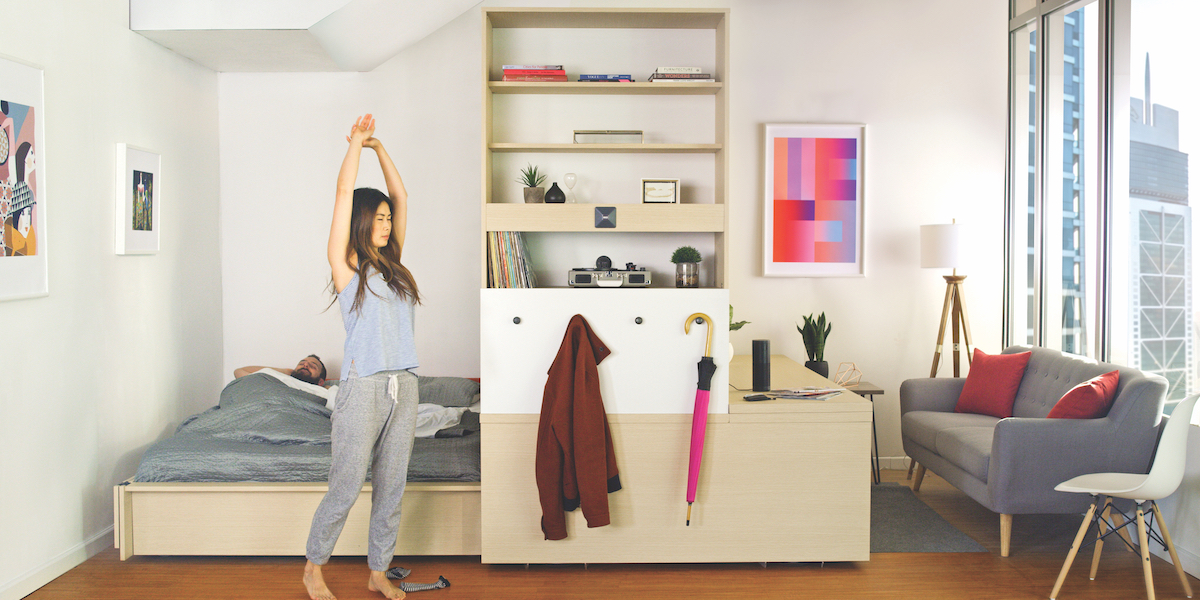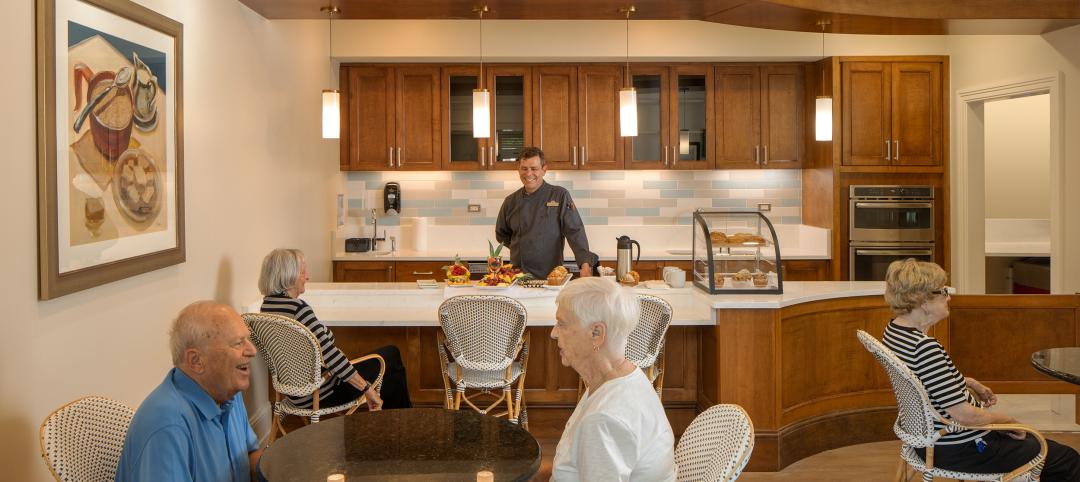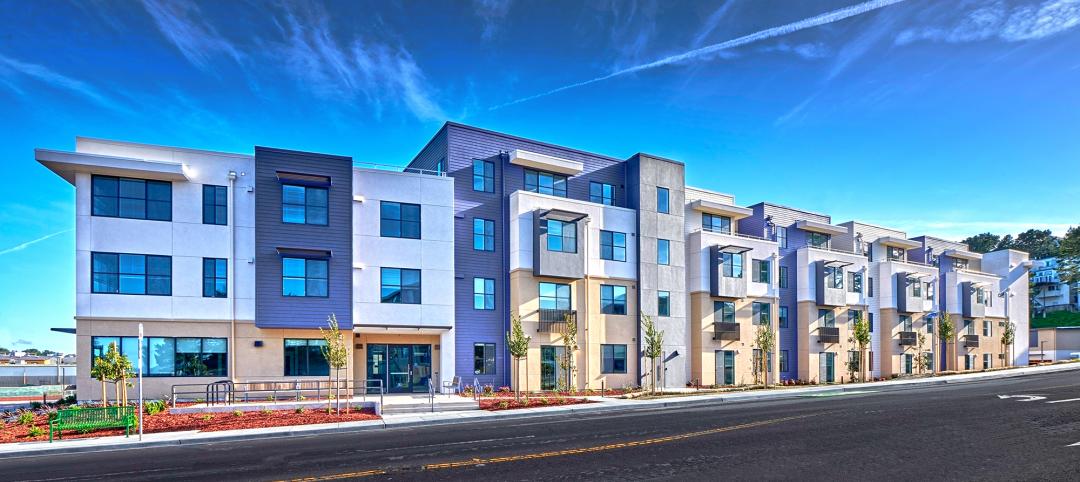What if furniture could have superpowers?
That’s the concept Hasier Larrea toyed with as he and his fellow MIT Media Lab graduate students—Carlos Rubio, Chad Bean, and Ivan Fernandez de Casadevante—explored how to use robotics to make interior spaces more efficient and usable.
That inquiry led to the founding four years ago of Boston-based Ori, Inc., which has developed two robotically controlled, space-saving furniture systems: Ori Studio Suite (and its Studio Suite Slim version), a movable structure that holds a bed, desk, table, and TV nook and has room for storage; and Ori Pocket Closet, which comes with similar accoutrements minus the bed.
SEE ALSO: What multifamily developers are saying about Ori Living's robotic interior system
To date, Ori has installed nearly 100 of its robotic furniture systems in more than 25 apartment buildings, primarily in Boston, Chicago, Miami, and San Francisco—cities where affordable rentals are scarce. But it took the inventor most of the decade to get market acceptance for what originally seemed like a pie-in-the-sky technology.
Larrea grew up in San Sebastián, in Spain’s Basque region. He played fútbol for Real Sociedad through high school and went on to earn BS and MS degrees in mechanical engineering at the University of Navarra. In 2011, he got an opportunity to work with Kent Larson, Director of the City Science research group at the MIT Media Lab.
Larrea and Larson challenged themselves to go beyond traditional thinking about interior spaces as “assigned” to a single function—a bedroom only, a living room only. “We wanted to bring mechanics software and control into a moving wall, to remove the physical constraints so that you could use as much of the space as possible,” said Larrea. They called the new field of research “robotic interiors.”
Starting in 2014 or so, Larrea, aided by his fellow grad students, developed several prototypes, many of them inspired by their work at MIT’s LEGO Mindstorms. The next crucial step was to standardize the product. “We wanted to create a kit of parts, so that every time we had a new idea—for electronics, or software, or safety—we wouldn’t have to start from scratch.” Standardization, they believed, was crucial to the success of the system. “There are only so many ways you can move things in three dimensions,” said Larrea.
After graduating from the MIT program in 2015, Larrea launched the company through the MIT delta v student entrepreneurship program. His thesis reviewer, the Media Lab’s Nicholas Negroponte, introduced him to industrial designer Yves Behar, whose FuseProject team came up with the brand name for the product: “ori,” a Japanese term meaning “to fold” (think “origami”).
Ori rented an apartment in Boston’s Seaport district to test the product. “We got random people to stay for a weekend over a two-year period, to see what they liked and didn’t like,” said Larrea. “The system proved to be incredibly robust.” After rigorous safety testing the system has been certified by UL.
I asked Larrea why the big furniture makers didn’t come up with such a system. “Furniture makers and robotics people don’t understand each other,” he said. “That’s where we saw the potential to bring these two fields together.”
Next up: The Ori “Cloud Bed,” a robotically controlled bed that descends from the ceiling, deus ex machina–style.
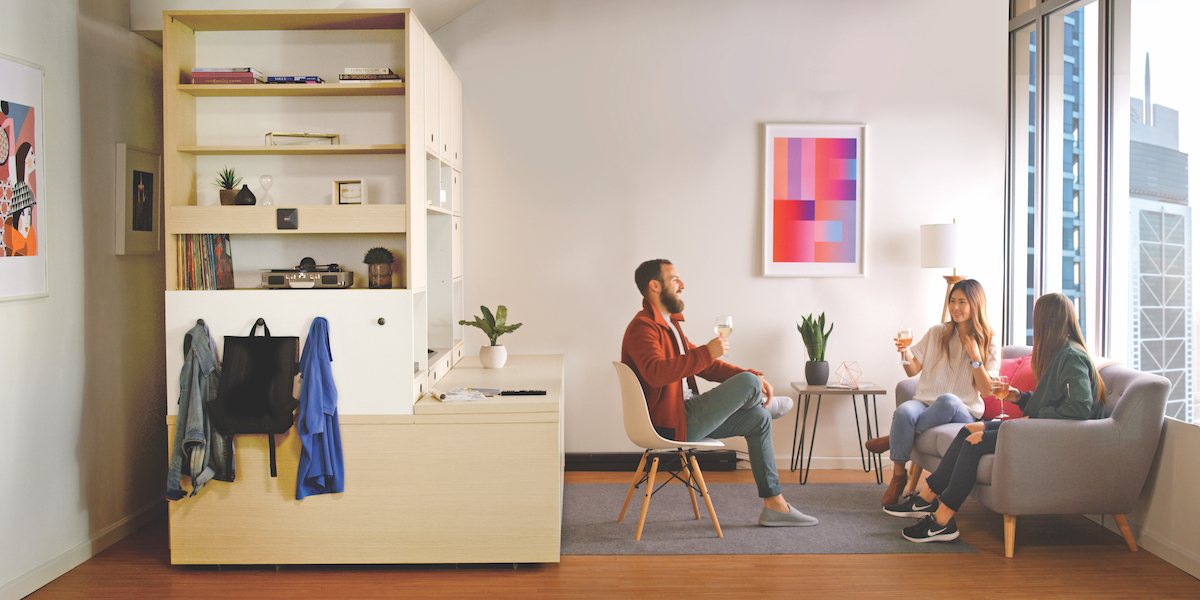
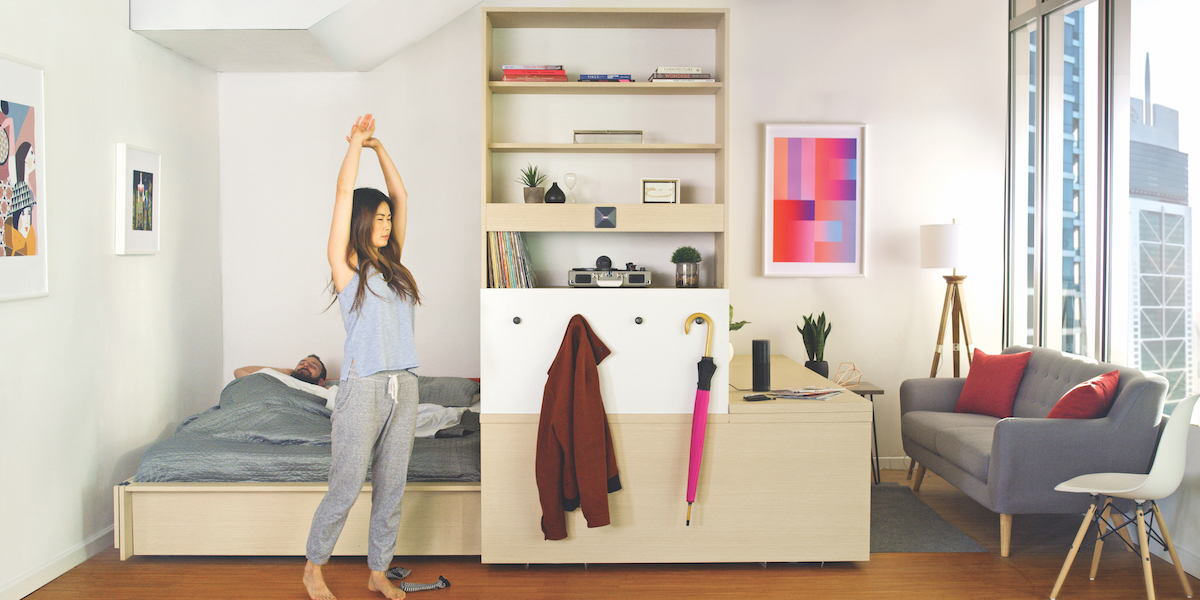 Ori Studio Suite in daytime position (top) and in nighttime position (bottom). Photos: Ori Living
Ori Studio Suite in daytime position (top) and in nighttime position (bottom). Photos: Ori Living
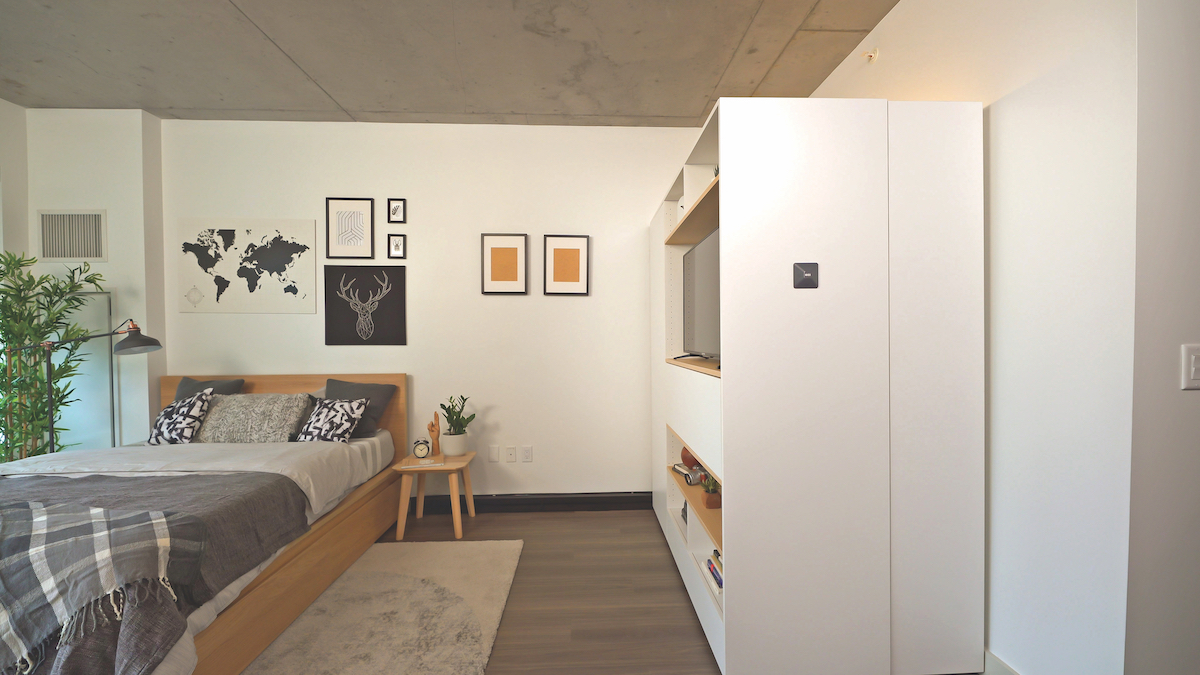
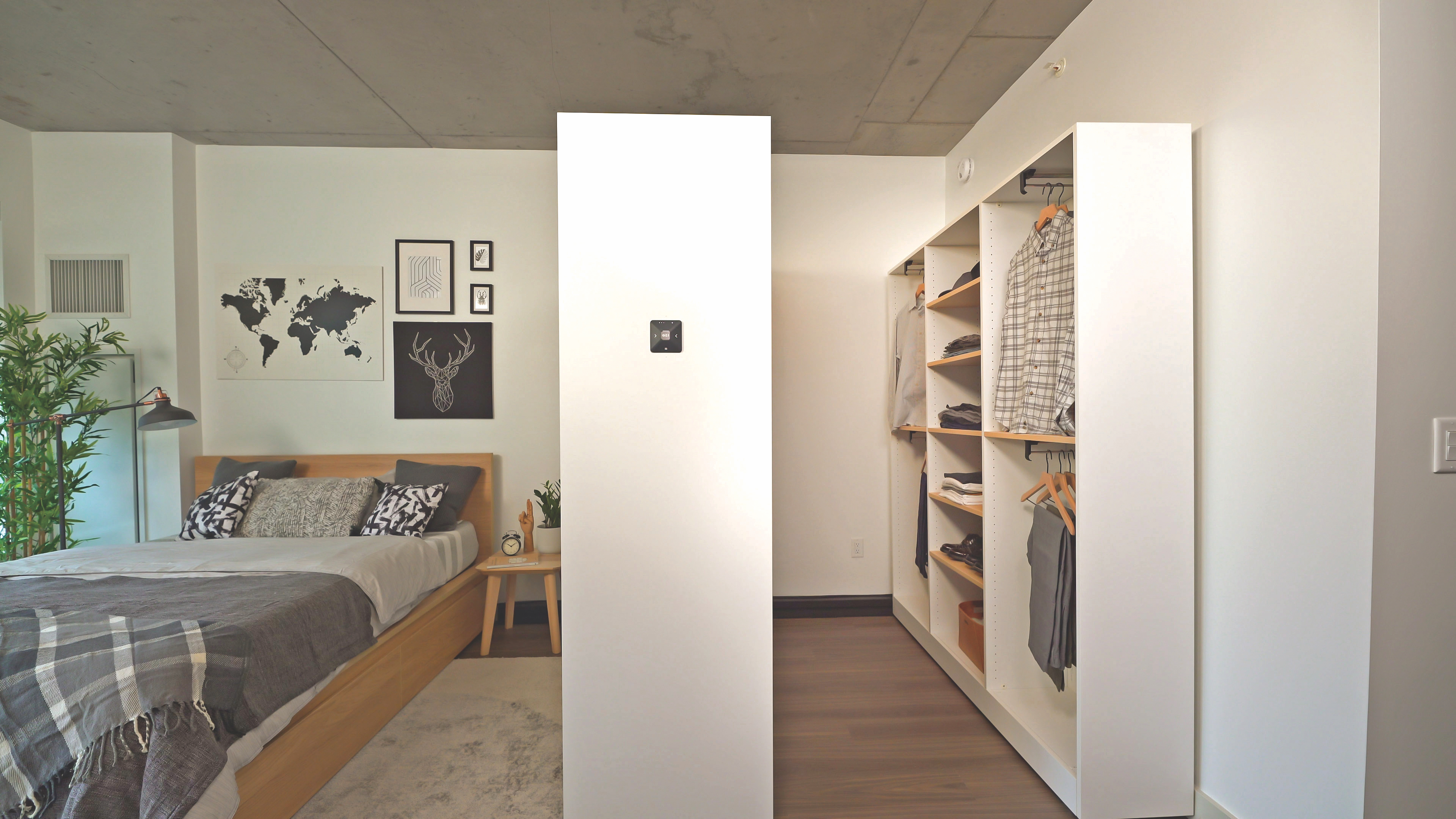 Ori Pocket Closet in closed position (top). It opens (via black button) for access to clothes, etc. (above). Pocket Closet comes with 110 cubic feet of storage, 140 inches of hanging space, a desk, 48-inch TV nook, LED lighting, three outlets, and two USB ports and adds the equivalent of 40 square feet of usable space to an apartment. Cost: $3,000 to $7,000. Photos: Ori Living
Ori Pocket Closet in closed position (top). It opens (via black button) for access to clothes, etc. (above). Pocket Closet comes with 110 cubic feet of storage, 140 inches of hanging space, a desk, 48-inch TV nook, LED lighting, three outlets, and two USB ports and adds the equivalent of 40 square feet of usable space to an apartment. Cost: $3,000 to $7,000. Photos: Ori Living
Related Stories
Multifamily Housing | Jan 12, 2023
8 noteworthy multifamily housing projects, including a refuge for unsheltered youth
Join us on a nationwide tour of notable new multifamily projects from around the country.
Senior Living Design | Jan 10, 2023
8 senior living communities that provide residents with memory care
Here are eight senior living communities that offer their residents memory care, an important service for residents who need this specialized care.
Government Buildings | Jan 9, 2023
Blackstone, Starwood among real estate giants urging President Biden to repurpose unused federal office space for housing
The Real Estate Roundtable, a group including major real estate firms such as Brookfield Properties, Blackstone, Empire State Realty Trust, Starwood Capital, as well as multiple major banks and CRE professional organizations, recently sent a letter to President Joe Biden on the implications of remote work within the federal government.
Multifamily Housing | Jan 9, 2023
New York City advances plan to build 500,000 new housing units
After New York Mayor Eric Adams announced a “Moonshot” plan to build 500,000 new housing units over the next 10 years in early December, he moved quickly to jumpstart the process.
Sustainability | Jan 9, 2023
Innovative solutions emerge to address New York’s new greenhouse gas law
New York City’s Local Law 97, an ambitious climate plan that includes fines for owners of large buildings that don’t significantly reduce carbon emissions, has spawned innovations to address the law’s provisions.
Fire and Life Safety | Jan 9, 2023
Why lithium-ion batteries pose fire safety concerns for buildings
Lithium-ion batteries have become the dominant technology in phones, laptops, scooters, electric bikes, electric vehicles, and large-scale battery energy storage facilities. Here’s what you need to know about the fire safety concerns they pose for building owners and occupants.
Multifamily Housing | Dec 29, 2022
San Jose is largest U.S. city to abolish minimum parking for new housing
San Jose, Calif., recently became the largest U.S. city to strike down minimum parking requirements for new housing development. The city reversed zoning devised in the 1950s that reputedly gave it the worst sprawl of parking space in northern California.
Codes and Standards | Dec 29, 2022
New York City multifamily owners concerned over fires caused by e-bikes
In 2022, there have been nearly 200 fires and six deaths in New York City caused by lithium-ion batteries used in mobility devices such as electric bikes and scooters.
Multifamily Housing | Dec 27, 2022
Traverse Apartments brings 281 sorely needed rental units to the Denver area
Traverse Apartments offers 281 units, designed by KTGY, is located in Lakewood, Colo.
Multifamily Housing | Dec 21, 2022
Bay Area school district builds 122 affordable apartments for faculty and staff
The 122 affordable apartments at 705 Serramonte, Daly City, Calif., were set aside not for faculty and staff at Jefferson Union High School District.


